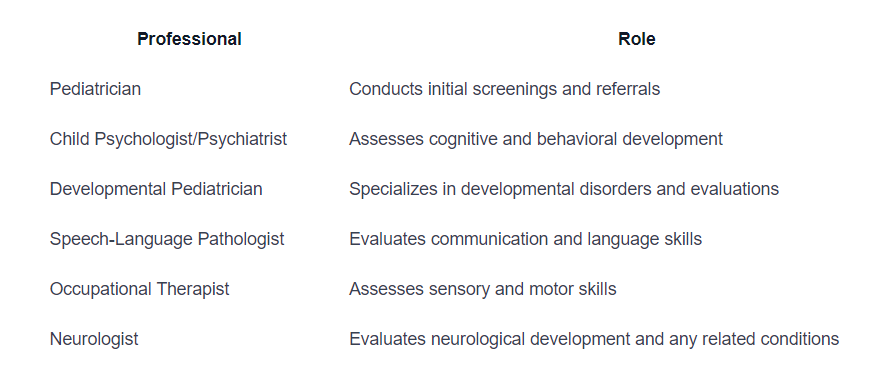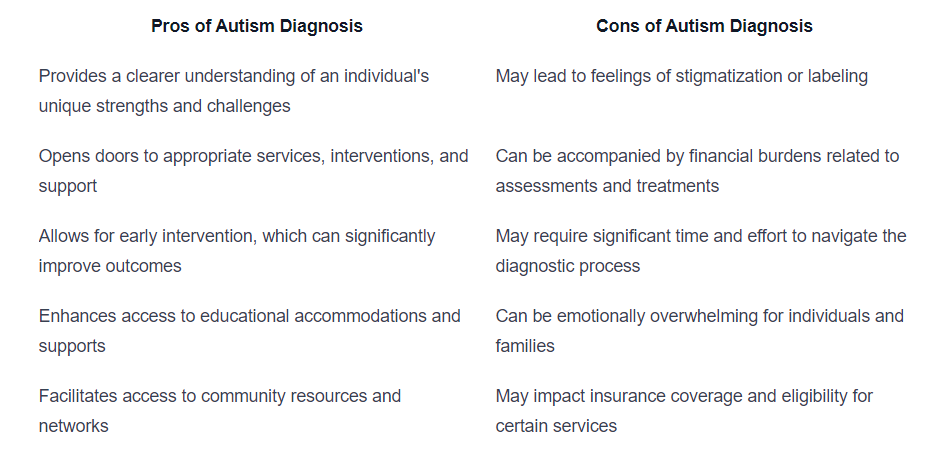Is it Worth Getting an Autism Diagnosis?
Deciding on an autism diagnosis: Weighing the worth for individuals and families. Empower your choices with informed decisions.

Understanding Autism Diagnosis
When it comes to autism spectrum disorder (ASD), understanding the diagnosis is essential in order to make informed decisions about seeking support and interventions. This section provides an overview of what autism spectrum disorder is and emphasizes the importance of early diagnosis.
What is Autism Spectrum Disorder (ASD)?
Autism spectrum disorder (ASD) is a neurodevelopmental disorder that affects communication, social interaction, and behavior. It is characterized by a range of symptoms and challenges that vary in severity from person to person. Individuals with ASD may have difficulties with social communication, repetitive behaviors, sensory sensitivities, and the ability to adapt to change.
ASD is referred to as a spectrum disorder because it encompasses a wide range of abilities and challenges. Some individuals with ASD may have exceptional skills in specific areas, while others may require significant support in daily functioning. It is important to recognize that autism is not a disease or a condition that can be "cured," but rather a unique way of experiencing the world.
Importance of Early Diagnosis
Early diagnosis of autism spectrum disorder is crucial for several reasons. Recognizing the signs and symptoms of ASD in early childhood allows for early intervention, which can significantly improve outcomes for individuals on the spectrum. Early intervention services, such as speech and occupational therapy, can help address communication difficulties, social skills, and behavioral challenges.
An early diagnosis also enables families to access appropriate support and resources. It provides an opportunity for parents and caregivers to better understand their child's needs and develop strategies to support their development. Additionally, an early diagnosis can help in advocating for accommodations and services within educational settings.
While there is no specific medical test for diagnosing autism, a comprehensive evaluation is typically conducted by a team of professionals, including psychologists, pediatricians, and speech and language therapists. The diagnostic process involves assessing the individual's behavior, communication skills, and social interactions, as well as gathering information from parents and caregivers.
By understanding what autism spectrum disorder entails and recognizing the importance of early diagnosis, individuals and families can make informed decisions about seeking support and interventions. It is important to remember that each person with autism is unique, with their own strengths and challenges. With the right support and resources, individuals with ASD can lead fulfilling lives and reach their full potential.
Factors to Consider
When it comes to the decision of getting an autism diagnosis, there are several factors that individuals and families should consider. Understanding the benefits as well as the challenges and concerns associated with an autism diagnosis can help in making an informed decision.
Benefits of Getting an Autism Diagnosis
Getting an autism diagnosis can provide numerous benefits for individuals and their families. Some of the key advantages include:
- Access to Support Services: A formal diagnosis opens doors to a range of support services and interventions specifically tailored for individuals with autism. These services can include therapies, educational programs, and assistance with daily living skills.
- Early Intervention: Early diagnosis allows for early intervention, which has been shown to significantly improve outcomes for individuals with autism. Early intervention programs can help develop important skills, such as communication, social interactions, and adaptive behaviors.
- Understanding and Acceptance: An autism diagnosis can provide individuals and their families with a better understanding and acceptance of the challenges they may face. It helps explain certain behaviors and allows for appropriate adjustments to be made in various aspects of life, including education, work, and social interactions.
- Advocacy and Legal Rights: Having an official diagnosis can strengthen an individual's rights and access to accommodations and support in educational, employment, and community settings. It can facilitate the development of an individualized education plan (IEP) and access to disability services.
Challenges and Concerns
While there are clear benefits to obtaining an autism diagnosis, it is important to acknowledge the challenges and concerns that may arise:
- Stigma and Misunderstanding: Some individuals and families may worry about the stigma associated with an autism diagnosis. There can be misconceptions and misunderstandings about autism, which may lead to discrimination or social difficulties.
- Diagnostic Process: The diagnostic process itself can be time-consuming, requiring multiple assessments and evaluations. It may involve different professionals, such as psychologists, psychiatrists, and developmental pediatricians. The process can be emotionally challenging for individuals and families, as it involves discussing personal and sensitive information.
- Labeling and Identity: Some individuals and families may be concerned about the potential impact of a diagnosis on their identity and self-perception. They may worry about being defined solely by their diagnosis, rather than as a whole person with unique strengths and abilities.
- Financial Considerations: Depending on the region and healthcare system, the costs associated with diagnosis, therapy, and ongoing support services may be a concern for individuals and families. It's important to consider the financial implications and available resources.
Understanding the potential benefits and challenges of an autism diagnosis can help individuals and families make an informed decision based on their unique circumstances. It is important to seek guidance from healthcare professionals and connect with support networks to navigate this decision-making process.
Seeking Professional Help
When considering an autism diagnosis, seeking professional help is essential. There are specific types of professionals involved in the diagnosis process, as well as a standardized diagnostic process and criteria.
Types of Professionals Involved in Diagnosis
Obtaining an accurate autism diagnosis often requires input from various professionals who specialize in assessing and diagnosing autism spectrum disorder (ASD). These professionals may include:

Collaboration among these professionals ensures a comprehensive evaluation, as they each bring unique expertise to the diagnostic process. It's important to consult with a primary care physician or pediatrician for guidance on which professionals to approach for an autism diagnosis.
Diagnostic Process and Criteria
The diagnostic process for autism involves a thorough assessment of an individual's behavior, communication, and social interactions. The criteria used for diagnosis are outlined in the Diagnostic and Statistical Manual of Mental Disorders (DSM-5), a widely accepted diagnostic manual used by healthcare professionals.
The DSM-5 criteria for autism include two core domains: persistent deficits in social communication and social interaction, and restricted, repetitive patterns of behavior, interests, or activities. These criteria are further divided into specific diagnostic criteria that professionals use to evaluate individuals for an autism diagnosis.
The diagnostic process typically involves:
- Initial Screening: A primary care physician or pediatrician may conduct a preliminary screening to identify potential signs of autism. If concerns are raised, a referral to a specialist is made.
- Comprehensive Assessment: Professionals, such as child psychologists, developmental pediatricians, and speech-language pathologists, conduct a comprehensive evaluation. This may involve interviews, observations, standardized assessments, and gathering information from caregivers, teachers, and other relevant individuals.
- Diagnostic Team Collaboration: Professionals involved in the assessment process collaborate to analyze the collected data and determine if an autism diagnosis is appropriate. This multidisciplinary approach ensures a comprehensive evaluation and accurate diagnosis.
It's important to note that the diagnostic process can vary depending on the age of the individual, their specific needs, and the available resources in the community. Seeking professional help and following the diagnostic process is crucial for obtaining an accurate autism diagnosis and accessing appropriate support and interventions.
Understanding the involvement of different professionals and the diagnostic process can help individuals and families make informed decisions regarding an autism diagnosis. By seeking the expertise of professionals and following the standardized criteria, individuals with autism can receive the support and resources needed for their unique journey.
Support and Resources
When considering whether it is worth getting an autism diagnosis, it is important to understand the support and resources available to individuals and families. These resources can play a crucial role in providing assistance, guidance, and interventions to help navigate the challenges associated with autism spectrum disorder (ASD).
Access to Services and Interventions
One of the key benefits of obtaining an autism diagnosis is gaining access to a wide range of services and interventions. These resources are designed to support individuals with ASD in various aspects of their lives, including education, therapy, and social development.
Services and Interventions
Early intervention programs
Special education services
Speech, occupational, and behavioral therapy
Social skills training
Individualized education plans (IEPs)
Assistive technology
These services and interventions are tailored to meet the unique needs of individuals with ASD, helping them reach their full potential and improve their quality of life. Early intervention, in particular, has proven to be highly effective in promoting positive outcomes for children with autism. It focuses on providing support and therapy at a young age when the brain is most receptive to learning and development.
Community and Peer Support
Alongside professional services, the autism community and peer support play a significant role in providing valuable resources and a sense of belonging. Connecting with other individuals and families who have firsthand experience with ASD can offer emotional support, practical advice, and a platform for sharing experiences.
Having a strong support network can help individuals and families navigate the challenges associated with autism. It provides an opportunity to learn from others, share coping strategies, and find comfort in knowing that they are not alone in their journey.
Community and Peer Support
Support groups and networks
Online forums and communities
Parent advocacy groups
Autism awareness events
Mentorship programs
These community-driven initiatives foster a sense of understanding, acceptance, and empowerment. They enable individuals and families to connect with others who can relate to their experiences, providing a safe space to share concerns, celebrate achievements, and access valuable resources.
By obtaining an autism diagnosis, individuals and families gain access to a wide array of support services and resources. These services, ranging from early intervention programs to community support groups, offer guidance, interventions, and a sense of community. While the decision to pursue a diagnosis is a personal one, it is important to consider the potential benefits and opportunities that these resources can provide in supporting individuals with autism and their families.
Personal and Family Impact
Receiving an autism diagnosis can have a significant impact on both individuals and their families. This section explores the emotional and psychological effects of an autism diagnosis, as well as the dynamics and relationships within the family.
Emotional and Psychological Effects
An autism diagnosis can evoke a range of emotions for individuals and their families. It is common for parents to experience feelings of shock, grief, or guilt upon receiving the diagnosis. They may go through a period of adjustment as they come to terms with the diagnosis and the potential challenges their child may face.
For individuals on the autism spectrum, the emotional impact of a diagnosis can vary. Some may feel a sense of relief, as the diagnosis provides an explanation for their experiences and challenges. It can also offer validation and a sense of belonging within the autism community. However, others may experience feelings of confusion, anxiety, or frustration as they navigate the complexities of living with autism.
It is important to recognize that the emotional and psychological effects of an autism diagnosis can extend beyond the individual and impact the entire family unit. Siblings may have questions and concerns about their sibling's diagnosis, while parents may experience stress and worry about the future. It is crucial for families to seek support and resources to help them navigate these emotions and promote overall well-being.
Family Dynamics and Relationships
An autism diagnosis can have a profound impact on family dynamics and relationships. Each family member may need to adjust to new routines, therapies, and interventions that are part of the autism management process. This adjustment period can sometimes lead to changes in roles and responsibilities within the family.
Siblings of individuals with autism may experience a mix of emotions. They may feel a sense of responsibility to support their sibling, while also grappling with their own needs for attention and understanding. Open and honest communication within the family can help address these challenges and foster empathy and understanding among all family members.
Parents may find themselves dedicating significant time and energy to supporting their child with autism, which can sometimes strain their relationships with partners or other children. It is important for parents to prioritize self-care and seek respite and support when needed. By nurturing their own well-being, parents can better support their child with autism and maintain healthy family relationships.
In some cases, an autism diagnosis can also bring families closer together. It can create opportunities for shared experiences, empathy, and a deeper understanding of one another. Families may discover new strengths and resilience as they navigate the challenges and joys of life with autism.
Understanding the personal and family impact of an autism diagnosis is essential for individuals and families to navigate their journey with autism. By acknowledging and addressing the emotional and psychological effects, as well as fostering supportive family dynamics and relationships, families can create a nurturing and empowering environment for everyone involved.
Making Informed Decisions
When it comes to the autism diagnosis conundrum, individuals and families are faced with the task of making informed decisions. This involves weighing the pros and cons of pursuing an autism diagnosis and considering the potential impact on their lives. Additionally, it is crucial to empower individuals and families with the knowledge and resources needed to navigate this complex journey.
Weighing the Pros and Cons
Before making a decision regarding an autism diagnosis, it is essential to carefully consider the potential benefits and challenges. Here are some key factors to consider:

By weighing the pros and cons, individuals and families can better evaluate the potential benefits and challenges associated with an autism diagnosis. It is important to consider the unique needs and circumstances of the individual in question, as well as their goals and aspirations.
Empowering Individuals and Families
Regardless of the decision made, it is crucial to empower individuals and families with the knowledge and resources needed to navigate the autism diagnosis journey. Here are some ways to offer support and empowerment:
- Education and Awareness: Providing access to accurate and up-to-date information about autism spectrum disorder (ASD) can help individuals and families make informed decisions. This includes understanding the diagnostic process, available interventions, and support services.
- Guidance from Professionals: Seeking guidance from healthcare professionals, such as pediatricians, psychologists, and developmental specialists, can provide valuable insights and help individuals and families make informed decisions. These professionals can guide individuals through the diagnostic process and provide recommendations for appropriate interventions and supports.
- Peer Support and Community: Connecting with other individuals and families who have gone through similar experiences can be incredibly empowering. Support groups, online communities, and local organizations can offer a sense of belonging, understanding, and guidance.
- Advocacy and Self-Advocacy: Encouraging individuals with autism and their families to advocate for their needs and rights is crucial. Empowering them to actively participate in decision-making processes, IEP meetings, and treatment planning can help ensure their voices are heard and their unique needs are met.
By providing individuals and families with the necessary tools, knowledge, and support, the journey towards an autism diagnosis becomes more manageable. It is important to remember that each individual is unique, and the decision-making process should be tailored to their specific circumstances and needs.
Sources
https://www.abtaba.com/blog/getting-an-autism-diagnosis
https://www.autismspeaks.org/expert-opinion/should-i-pursue-autism-diagnosis-adult
https://www.crossrivertherapy.com/autism/is-it-worth-getting-an-autism-diagnosis
Similar articles
We’re here to help you

Our team is here to assist you in this process. Contact us for any assistance.
it’s easy to apply
We Accept Most Insurances
Our in-network insurance partnerships make ABA therapy more accessible to families throughout our service areas.







Our Insurance Process
We'll request your insurance details to help us verify your plan's coverage for ABA therapy. Once we've received this information, we'll walk you through your benefits, including copayments, deductibles and out-of-pocket maximums, so you know what to expect in advance.
Our team will then handle the preauthorization and all the necessary paperwork.
.svg)





















.jpeg)


































.jpeg)




.jpeg)







.jpeg)











.jpeg)
















